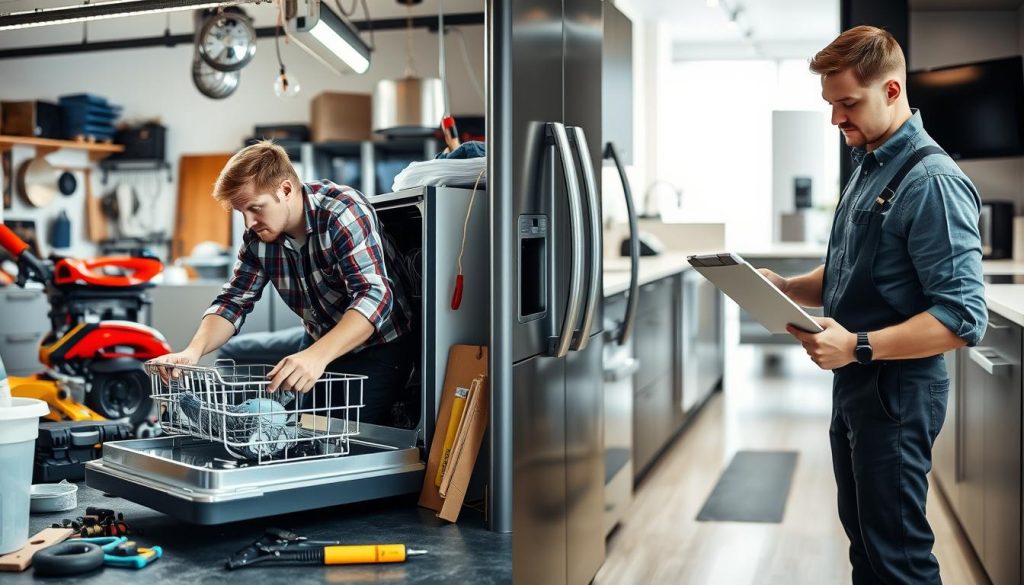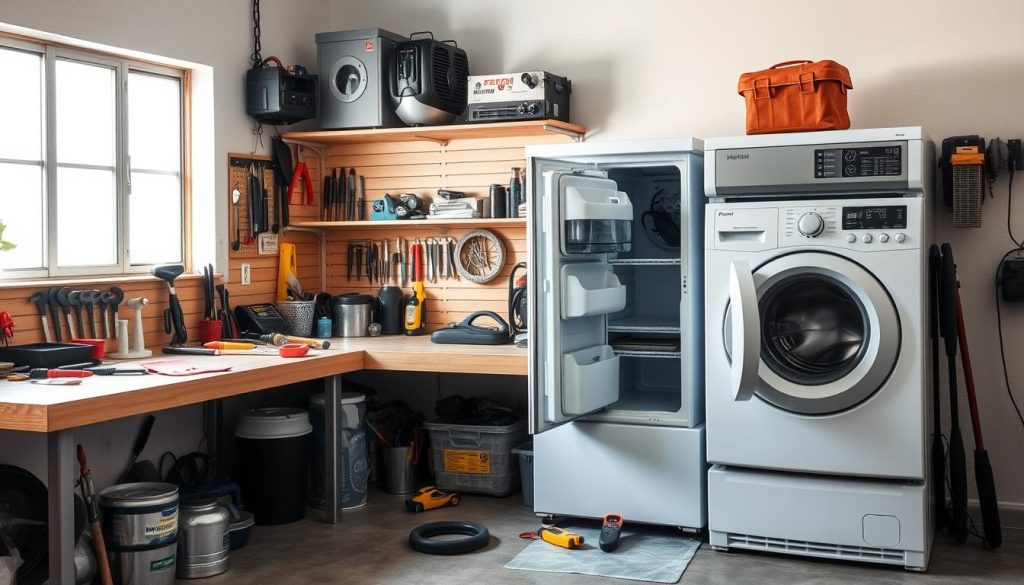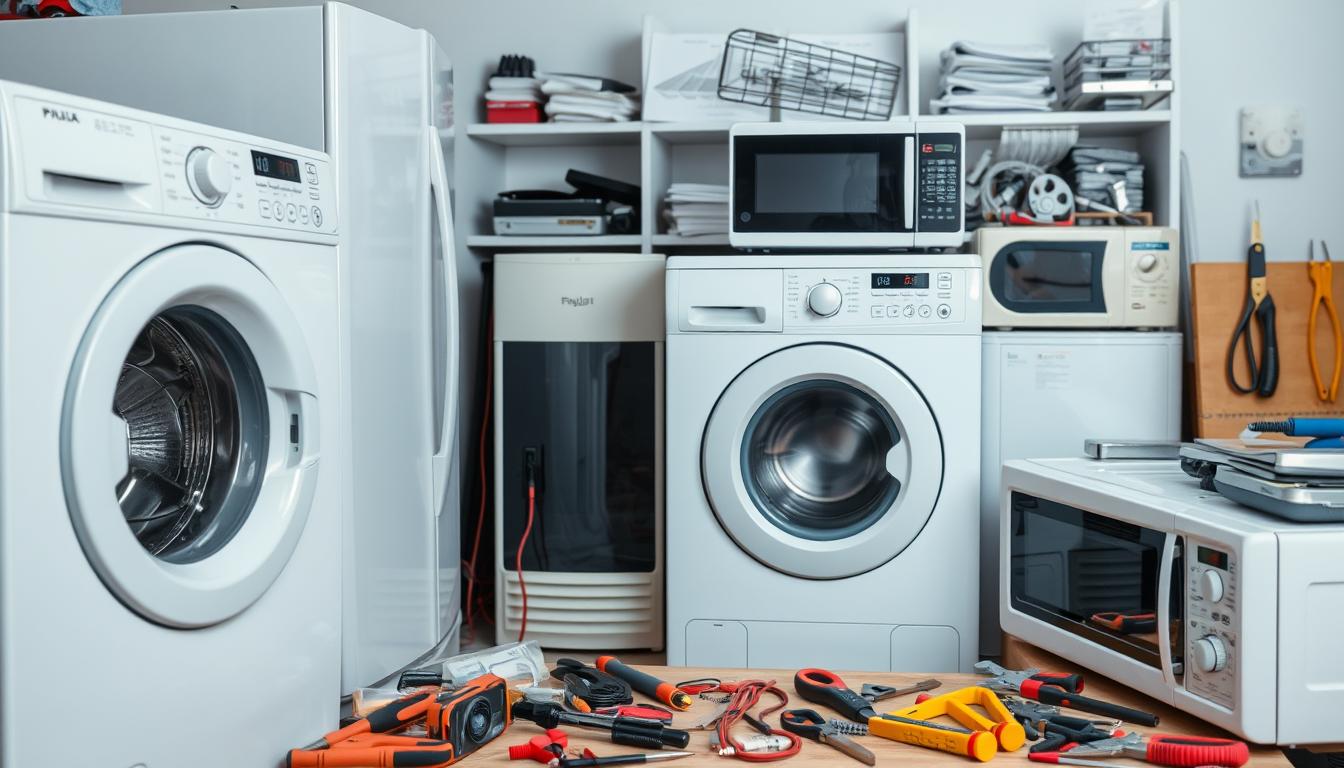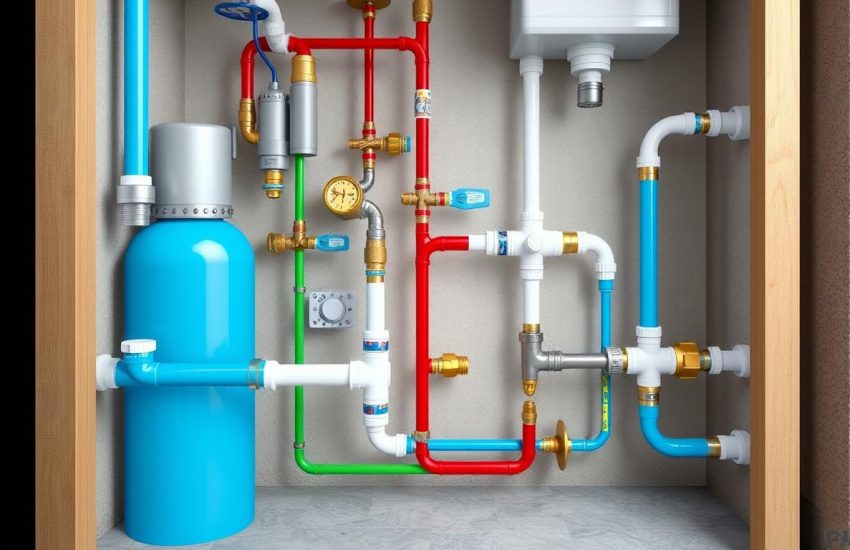Appliance Repair Tips: A Complete Guide for Homeowners
Ever had an appliance glitch take over your home? Appliance repair tips offer hope and help you save money. They empower you to fix problems with your own hands. Imagine fixing things yourself with DIY appliance repair tips.
Imagine the joy of a machine running smoothly because of you. Learn secrets from your user manual. Discover tools like the HVACR manifold gauge. Always remember to cut the power before starting a repair.
By keeping your appliances clean and inspecting them, you make them last longer. Your washing machine and fridge will thank you. This saves money and keeps them working well. Are you ready to see how far you can go fixing things yourself?
Key Takeaways
- Understanding the importance of regular appliance maintenance to prevent performance-affecting buildup.
- Recognizing when it’s time to call in professionals for complex or hazardous repairs.
- The necessity of reading your appliance manual for effective troubleshooting.
- Prioritizing safety with PPE and by turning off power to appliances before repairs.
- Acknowledging the cost savings and convenience benefits of DIY appliance repairs.
- The empowerment and knowledge gained from tackling appliance issues on your own.
- Recognizing your limitations in DIY repairs to ensure safety and success.
Why Focus on Appliance Repair Tips?
Knowing affordable appliance repair tips is key for any homeowner. These tips help make your appliances last longer and work better. From leaky washers to loud fridges, the right tips can save you money and trouble.
Repairing an appliance, instead of getting a new one, saves cash. Fixing common fridge or oven problems adds years to their lives. Also, regular upkeep stops little issues from becoming big ones.
By learning save money on appliance repair tips, you also avoid harming your appliances. Following the maker’s care instructions keeps them running right. This also protects your warranty.
If fixing appliances yourself seems hard, get help from pros. Regular check-ups from certified technicians can stop major damage. This makes using expert help a smart move for tough or risky fixes.
Knowing affordable appliance repair tips helps you find good local technicians, too. A good repair person can fix things well without surprise fees. This keeps repair costs down.
- Clean parts like filters and seals to keep appliances running well.
- Spot problems early with maintenance checks to avoid costly repairs later.
- Use skilled local repair services for complex fixes.
In summary, good appliance repair tips save money, make appliances last longer, and keep your home safe and efficient. It’s a wise move for any homeowner.
DIY vs Professional Help
Choosing DIY or professional help for appliance repair is big for homeowners. It affects costs and how long your devices last. Know when to fix things yourself or call an expert.
DIY appliance repair is good for small fixes. Like unclogging a filter. It saves money and teaches you about your devices. But, think about how hard the fix is and if you have the right tools. Trying to fix modern appliances yourself might break warranties or cause more damage.

Professional help means you get someone with lots of experience and the right tools. It’s best for tricky or dangerous repairs, like those with wires or gas. Some repairs must be done by certified professionals, by law.
The table below shows what to think about when choosing how to repair appliances:
| Aspect | DIY Repair | Professional Repair |
|---|---|---|
| Cost | Lower up-front costs, no labor fees | Higher costs due to labor fees |
| Skills Needed | Basic to moderate handyman skills | Advanced, specialized training |
| Safety Risks | Potential risks if not knowledgeable | Handled by trained professionals |
| Tool Availability | Limited to common household tools | Access to specialized, professional tools |
| Time Commitment | Varies based on personal skill | Typically resolved quicker with expert handling |
When thinking about home improvement, decide between DIY or a pro. It depends on how hard the repair is and what you can do. Places like AllAppliance Tech & Repair in Ottawa offer great service. They are good for tough or risky repairs.
The choice can be hard. So, think about each part carefully. If unsure, talk to a pro to keep your devices and home safe.
How to Save Money
Learning to save money on appliance repair tips can greatly cut household costs. Knowing when to fix things yourself or call an expert is key. Doing regular checks prevents pricey repairs and keeps things running well for longer.
Starting with affordable appliance repair tips means doing simple things. Like cleaning filters and having tools ready. This can avoid costly repairs later on.
Strategic Troubleshooting: Try fixing things yourself before calling for help. This can avoid service charges. For items still under warranty, see if it covers repairs to save money.
| Task | Benefit | Frequency |
|---|---|---|
| Clean refrigerator condenser coils | Prevents overheating and enhances efficiency | Twice a year |
| Change refrigerator water filter | Ensures clean water and ice | Every six months |
| Clean dishwasher filter | Improves water flow and performance | Regularly |
| Run cleaning cycle in dishwasher | Removes limescale and odors | Monthly |
| Clean washing machine drum and dispenser | Prevents mold and mildew | As needed |
| Run hot wash cycle with cleaner in washing machine | Sanitizes and removes residues | Monthly |
Leverage Consumer Tools: Use tools like Consumer Reports’ web tool. It helps decide whether to fix or replace an appliance. Making smart, cost-saving decisions is easier with it.
Managing appliance care and smart repair choices can really save money on appliance repair tips. Regular upkeep, the right DIY attitude, and smart choices keep appliances in check. This makes home management both easy and budget-friendly.
Step-by-Step Upgrades
Upgrading your home appliances is a smart move for better performance and longer life. It’s about doing simple fixes and updates yourself. Knowing how to keep up and swap out bad parts can prevent future problems and costs.
| Appliance | Maintenance Task | Frequency | Common Replacement Signs |
|---|---|---|---|
| Refrigerator | Clean condenser coils | Twice a year | Food spoiling prematurely |
| Washer/Dryer | Clean lint trap and machine | After every load / Every six months | Unusual noise or leaks |
| HVAC Systems | Replace filters | 6 months to 1 year | Efficiency decrease |
| Dishwasher | Clean filters | As needed (~2-minute task) | Not cleaning dishes properly |
| Microwave | Check and replace faulty parts | As needed | Burning smells or sparks |

Improving your home is a valuable journey. Knowing about things like when to do maintenance saves you time and money. For example, fixing a fridge’s coils or keeping your air system well after winter can prevent sudden breaks.
If you’re upgrading appliances yourself, here are some DIY tips:
- Regularly check and replace your fridge’s seals for better energy use.
- For dryers that don’t heat, wash the lint filter with hot water to clear blockages.
- Make sure your stove’s burners are right in place. Even a small fix can avoid repair calls.
A good care routine for your home helps your appliances work better and last longer. This is smart for any homeowner.
Start with proper tools and knowledge. Keep up with regular care and know when to get help. These steps make up smart home care. Remember these DIY tips and improvement ideas to keep your home in great shape.
Final Tips for Success
Fixing appliances starts with being prepared and maintaining them well. Most appliance problems, about 70%, can be fixed early on. This stops the need for calling in a pro right away. But, only 30% of homeowners have the tools they need. This shows why it’s important to have a good set of tools. Having the right tools makes DIY fixes more successful and improves the repair work.
Safety is the most important thing when trying to fix an appliance. A big 85% of accidents happen because people don’t unplug their appliances first. You must also really understand the problem. Many people don’t have their appliance manual, which adds to the difficulty. When you need new parts, choose a supplier with high-quality ones. This helps your appliances last longer and work better after the fix.
Use the internet to find advice, videos, and how-tos for fixing things at home. It’s also smart to keep track of what you do when fixing things. This can help you avoid making mistakes. Though it feels great to fix things yourself, know when to call a pro. A skilled technician saves time, prevents problems, and makes sure things work right.
In short, mix being proactive, able to fix things yourself, and knowing when to get help. By following these tips, you can keep your home safe and your appliances working well. Your home will be a place where everything works like it should.



